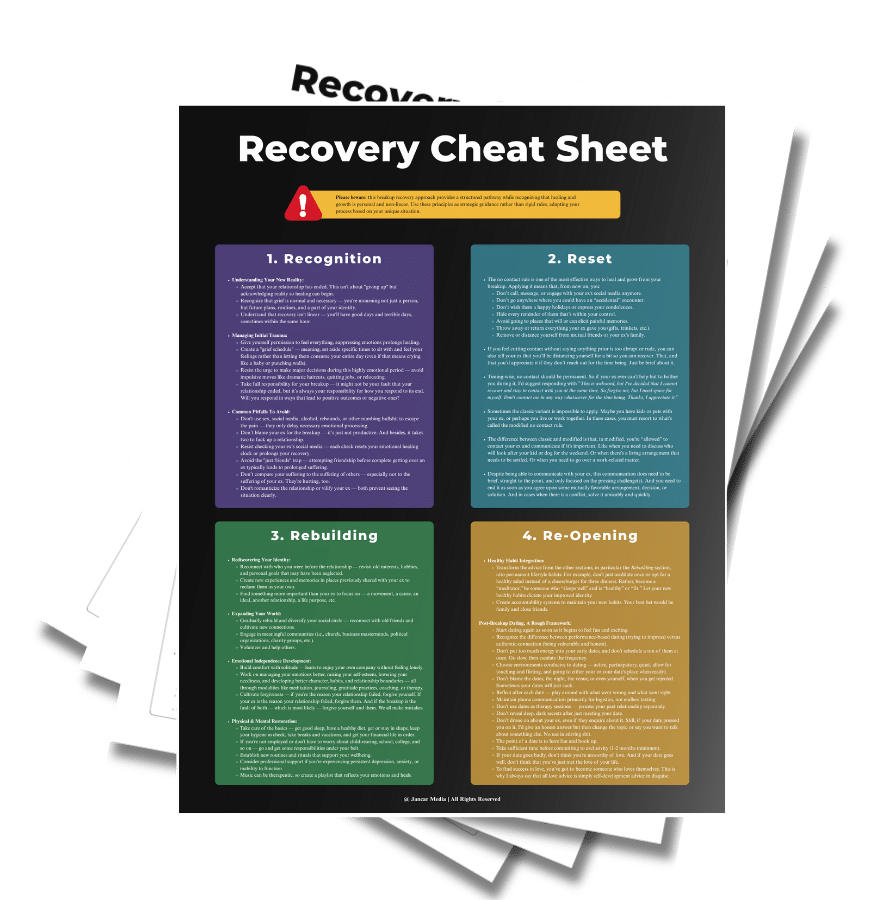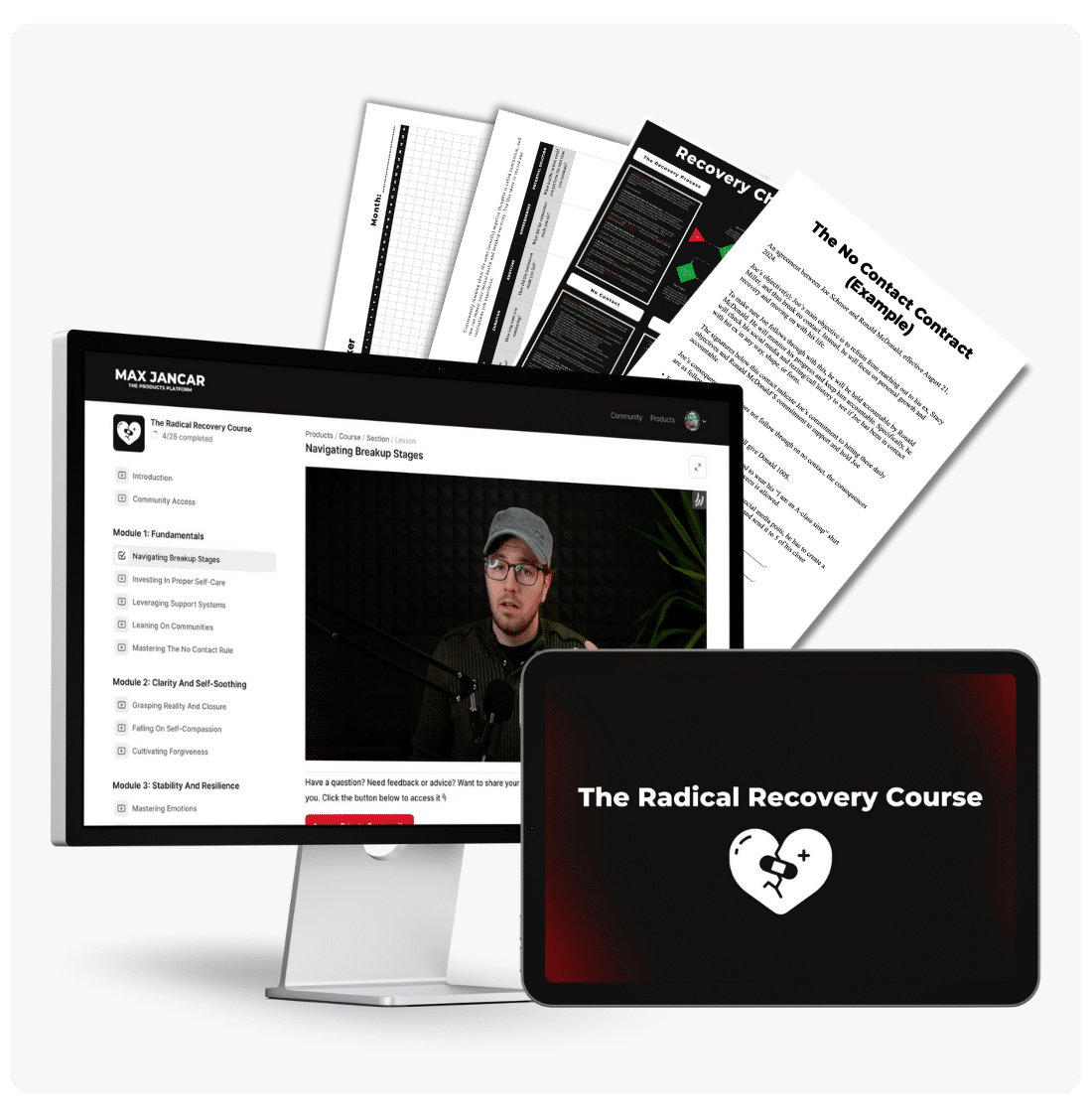Click play to listen to this article.
If you’re reading this, you’re probably obsessing over your ex. Maybe you can’t eat, can’t sleep, and feel like you’re going crazy without them. You keep replaying the good moments over and over and over again, desperetly convincing yourself that what you had was special, perhaps even irreplaceable.
And while everyone around you might be feeding you platitudes like “that’s just love” and “the heart wants what it wants,” I’m here to tell you something different: you might not actually be in love. You might simply be trauma-bonded.
A guide to breakup recovery based on embracing discomfort, extracting wisdom from dark moments, and healing through evidence-based practices.
Order Your CopyWhat Is A Trauma Bond
A trauma bond is essentially a deep attachment to someone who puts you through periods of extreme emotional highs and lows. It’s rooted in the same neurological mechanisms that drive addiction — because that’s essentially what it is: an addiction to a person, or more specifically, to the chemical cocktail your brain releases in response to them.
And no, trauma bonds aren’t just some pseudoscientific bullshit those cringe TikTok therapists throw around to get their sweet, succulent views. It’s a real psychological phenomenon that’s been studied and documented for decades, long before social media made amateur psychology accessible to the masses.
Here’s what’s happening in your brain when you’re trauma bonded to your ex: when they treat you well (which they strategically might do just often enough to keep you hooked), your brain floods with dopamine, oxytocin, and other feel-good chemicals. You experience a genuine high.
Then, when they withdraw affection, become abusive, or disappear, your stress hormones like cortisol and adrenaline spike. This creates a desperate yearning for relief — relief that you’ve been conditioned to believe only they can provide.
Over time, this cycle of intermittent reinforcement — unpredictable rewards and punishments — creates neural pathways in your brain that are virtually identical to those seen in drug addiction. Your rational mind might know your ex is bad for you, but your brain chemistry is screaming for another hit.
This isn’t real love — not even close. It’s a form of trauma, and the attachment you feel is your psyche’s misguided attempt to survive it.
This cheat sheet lays out 40+ solutions to overcoming a breakup so you can create a new opportunity for love — be that with your ex or someone completely different.
Get The Free Cheat Sheet5 Clear Signs You’re Trauma Bonded With Your Ex
1. You Know They’re Bad For You, But Still Want Them Back
Your friends tell you they’re toxic. Your family hates their guts. Hell, even YOU know they’re about as good for you as mainlining heroin. But you still find yourself stalking their Instagram at 3 AM, hoping to catch a glimpse of their life without you.
The cognitive dissonance is deafening. Part of you can clearly articulate all the ways your ex damaged you — the lies, the manipulation, the disrespect, whatever. Maybe you could write a whole fucking dissertation on their red flags. Yet simultaneously, another part of you is convinced that they’re your soulmate, that no one will ever understand you like they did.
This isn’t the normal ambivalence that can come with any breakup. This is your rational mind waging war against your trauma-bonded brain. And until you recognize this conflict for what it is, you’ll remain stuck in an emotional purgatory where logic cannot reach you.
2. You Keep Making Excuses For Their Shitty Behavior
“They only cheated because they were drunk.” “They only screamed at me because they had a rough day.” “They’re just struggling with commitment because of their shitty childhood.” “They’ll change if I just love them enough.”
Sound familiar?
The mental gymnastics required to justify an abuser’s behavior would impress Olympic judges. You’ve become their most dedicated apologist, even as they perhaps offer no genuine remorse or lasting change.
In healthy relationships, there’s no need for these elaborate explanations and justifications. People who love you in a healthy way don’t put you in positions where you have to constantly rewrite reality to make their actions acceptable. They don’t require you to shrink yourself, silence your needs, or pretend that crumbs of affection are a feast.
3. Your Relationship Was A Rollercoaster (And You Were Addicted To It)
One day they’re treating you like royalty, the next they’re giving you the silent treatment for something so minor you can barely remember what the hell it was. One week they’re planning your future together, the next they’re not sure they’re “ready to get back with you.” And weirdly enough, these dramatic swings (a.k.a., mixed signals) make you feel more attached, not less.
The highest highs and the lowest lows. Sound exciting? It’s not supposed to be. Healthy relationships are generally stable, even boring. Sure, they can be deeply fulfilling, passionate, and growth-promoting — but they don’t have these bizzare switngs between ecstasy and agony.
If you found yourself becoming more obsessed during or after the bad times, desperately trying to get back to the good, that’s a classic trauma response. You became hooked on the reconciliation — the relief of being back in your ex’s good graces after suffering through their coldness or rage.
4. You Feel Like You’re Going Through Withdrawal (Because You Literally Are)
And I mean literal, physical withdrawal — anxiety so intense it makes your chest tight, depression that feels like a weighted blanket you can’t throw off, insomnia that keeps you staring at the ceiling replaying every moment, loss of appetite that has your friends commenting on your “breakup diet.”
That’s not love, man. That’s your brain chemistry getting completely fucked with. Heartbreak can be painful in any context, sure, but there’s a difference between sadness and this kind of debilitating physical and psychological distress.
If you feel like you might actually die without your ex, if the thought of them with someone else makes you physically ill, if you can’t function in basic ways — that’s closer to withdrawal than it is to garden-variety heartache. Your body is literally craving the neurochemical cocktail that only they seem able to provide.
However, like any addiction, the only way out is through. The fix isn’t getting them back — it’s breaking the chemical dependency altogether, largely through no contact and therapy. More on this later…
5. You’ve Lost Your Identity (And You’re Not Sure How to Find It Again)
Meaning, you don’t recognize yourself anymore. Your hobbies? Gone. Your friendships? Neglected. Your boundaries? What boundaries? Your self-respect? Haven’t seen that guy in months.
One of the most insidious aspects of trauma bonding is how it gradually erases who you are. It happens so slowly you barely notice — a canceled plan with friends here, an abandoned interest there, a crossed boundary that you swore you’d never allow. Then one day you look in the mirror and wonder: who is this person who would tolerate things the “old you” would have run the hell away from?
In healthy love, both people grow. In trauma bonds, one person shrinks while the other expands to fill all available space. Your needs, preferences, and identity become secondary to maintaining the relationship at all costs. You might have even started to believe that this self-abandonment was somehow noble or romantic — that sacrificing everything for love made you the hero of your own tragic story.
But love doesn’t require this self-erasure. It doesn’t demand that you become smaller, quieter, or less yourself. If you can’t remember who you were before this relationship, or if who you were seems incompatible with who you became with your ex, that’s not growth — that’s a trauma response.
Trauma Bond Defenses: The Lies You’re Telling Yourself
“But We Had So Many Good Times Together”
Of course you did. That’s how trauma bonding works. The good times aren’t proof of love — they can easily also be the part of the cycle that keeps you hooked.
Think about it: if your ex was awful 100% of the time, you would have left and never looked back (I hope). It’s the moments of tenderness, the glimpses of who they could be if only they were consistent, that kept you hoping and coming back for more.
Remember: intermittent reinforcement is the most powerful behavioral conditioning tool known to psychology. It’s why gambling is so addictive — those unpredictable wins keep you pulling the lever long after you should’ve walked away from the slot machine.
Your ex isn’t different from all your other exes because they’re “the one” — they’re different because they deployed this psychological tactic, whether intentionally or instinctively.
The good times don’t negate or justify the bad. They’re part of the same abusive system, not evidence against it.
“But I’ve Never Felt This Intensely About Anyone Before”
Yeah, no shit. Trauma bonds are intense by design. Real love might be strong, but it doesn’t make you feel like you’re dying when the person leaves.
Just because a relationship feels intensely emotional doesn’t mean it’s healthy or loving. Some of the most intense human experiences — fear, pain, grief — are the ones we’d never willingly choose. Yet somehow, when it comes to relationships, we’ve been sold the lie that intensity equals significance.
Think of it this way: a paper cut doesn’t compare to the intensity of a third-degree burn, but that doesn’t make the burn preferable or more “meaningful.” It just makes it more damaging.
“No One Will Ever Understand Me Like My Ex Did”
Did they really understand you though? Or did they just gather the right information about you — your insecurities, your triggers, your deepest fears and desires — and then used it strategically? Was it understanding or was it well-meaning yet dangerous intelligence gathering?
Often, what feels like profound understanding is actually just the result of hypervigilance on your part. When you’re walking on eggshells around a volatile ex, you become exquisitely attuned to their moods, preferences, and patterns.
You study them with the dedicated attention of someone whose emotional safety depends on predicting another’s behavior. And this can create the illusion of a deep connection, when really it’s just survival-driven attentiveness.
True understanding comes with consistent respect. Someone who repeatedly violates your boundaries while claiming to “know you better than you know yourself” isn’t demonstrating understanding — they’re establishing control. Not to mention, they’re being a douche nugget.
How To Break Free From The Trauma Bond
An online course that teaches you how to heal and grow from a breakup so you can create a new possibility for love — with or without your ex.
Get Instant Access1. Accept That What You’re Feeling Is Addiction, Not Love
This is the hardest part of the process, because it requires you to question the central narrative you’ve been telling yourself: that this is an epic love story, not a psychological injury.
Well, guess what fuckface, it probably was merely a psych injury. Chances are that what you had was simply an unhealthy attachment formed under conditions of intermittent reinforcement and maybe some emotional manipulation here and there.
The good news? Once you can name what’s happening, you gain power over it. When you understand that your feelings have a neurobiological basis — that they’re more about dopamine, oxytocin, cortisol, and adrenaline than they are about destiny or soulmates — you can approach your healing like the detox process it actually is.
So let’s talk detox…
2. Implement Permament No Contact
That means no bullshit 30-day rule that so many other coaches promote, but real, no contact. Block your ex everywhere — not just the main places you communicate, but every digital outpost where their presence might ambush you. Block their phone number, email, and all social media accounts. Block their friends and family if you need to. Delete their number so you can’t impulsively reach out in a moment of weakness.
Throw out their stuff. All of it. The hoodie you sleep in, the love letters, the concert tickets you saved, the special gift they gave you “just because.” These aren’t precious mementos; they’re paraphernalia that triggers your addiction. You wouldn’t advise a recovering alcoholic to keep a bottle of whiskey on their nightstand “for the memories,” would you?
Now this isn’t about being dramatic or vindictive. It’s about creating the clean break your brain needs to begin rewiring itself. Every time you check your ex’s social media or reread old texts, you’re essentially prolonging your recovery. You’re hurting yourself.
And yes, this applies even if you have legitimate reasons to stay in contact: co-parenting, working together, shared friend groups. Find ways to minimize contact as much as practically possible. Use intermediaries, schedule handoffs to avoid face-to-face meetings, communicate only through parenting apps if applicable. Your recovery depends on it.
This also seems like a fitting place to reiterate that, no, you shouldn’t get back with an ex with whom you share a trauma bond. This is one of the few cases (along with long-distance relationships and highly abusive ones) where reconciliation isn’t just insanely unlikely but also severely damaging to both parties’ well-being.
3. Get Professional Help If You Can (This Isn’t DIY Territory)
Trauma bonding can create symptoms similar to PTSD, and trying to heal it through self-help books, supportive friends, even people like me who do breakup coaching, is like trying to set your own broken bone. These methods work best as mere supplements to professional help, not replacements for it.
So my advice is, look for therapists who specialize in trauma, attachment disorders, or emotional abuse. Approaches like EMDR, cognitive-behavioral therapy, and somatic experiencing can be particularly effective for the kind of brain rewiring you need.
And if therapy isn’t accessible due to financial constraints or other barriers, look into community resources, support groups, sliding-scale clinics, or telehealth options that might be more affordable.
4. Rebuild Your Identity — Who You Were Before The Breakup
You can’t unknow what you now know about human capacity for cruelty or your own capacity for endurance. But you can reclaim the core aspects of yourself that got buried under the avalanche of the trauma bond.
Start small. If you used to love reading but haven’t picked up a book in years because your ex mocked your taste in literature, get a library card. If you abandoned a hobby because they made it difficult for you to pursue it, dust off your supplies. If you neglected friendships because they isolated you, reach out (but be prepared for the possibility that bridges may need to be carefully rebuilt).
Pay special attention to your body, which has likely been carrying the physical burden of your stress. Exercise not just for how it might make you look, but for how it makes you feel: stronger, more capable, more present in your own skin. Nourish yourself with food that energizes rather than depletes. Sleep as regularly and restfully as you can.
And perhaps most importantly, begin to establish new values and boundaries — first with yourself, and then with others. What do you care about? What will you no longer tolerate? What do you now recognize as non-negotiable for your wellbeing? Your answers to these questions form the foundation of your rebuilt identity.
5. Understand That Breakup Recovery Isn’t Linear
You’ll have good days where you feel like you’re finally over your ex, followed by crushing days where you find yourself back in the depths of longing. You might dream about them just when you thought you were moving on. You might find yourself idealizing the relationship again after weeks of clarity and peace.
None of this is failure. It’s not evidence that you’re doing recovery wrong or that the trauma bond was “true love” after all. It’s just the reality of how we heal — not in a straight line, but in a messy, looping, two-steps-forward-one-step-back process.
When setbacks happen, treat yourself with the compassion you would show a friend. Would you tell a friend who relapsed after weeks of sobriety that they might as well give up? Or would you remind them that recovery is a practice, not a perfect performance, and encourage them to begin again?
Exactly…
Your recovery won’t ever be perfect or linear, but with persistence and self-compassion through the inevitable ups and downs, it will be complete. The path may be winding, but it does lead forward. Good luck.
This cheat sheet lays out 40+ solutions to overcoming a breakup so you can create a new opportunity for love — be that with your ex or someone completely different.
Get The Free Cheat SheetRelated Reading
- 7 Solutions For When You Can’t Sleep After A Breakup September 20, 2021
- A No Bullshit Guide To Self-Care After A Breakup September 7, 2023
- How To Deal With With Regret After A Breakup February 4, 2024
- Deserving Is Not The Point September 27, 2023
- How To Grow From Your Breakup Pain (7 Science-Backed Ways) April 20, 2022
- The Trauma That Ruined Your Relationship (And How To Heal It) October 15, 2020



